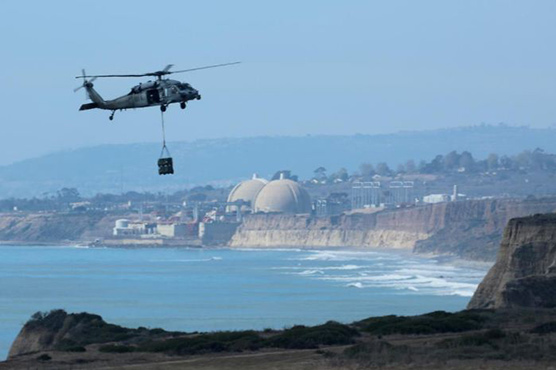Nuclear industry urges Trump to revive uranium mining with Cold War-era rule

U.S. Marines pass the decommissioned nuclear power plant San Onofre in California.
WASHINGTON (Reuters) - The U.S. nuclear energy industry has called for the Trump administration to revive domestic uranium mining and enrichment by unlocking funds through a Cold War-era program, in a letter sent to a Cabinet-level working group.
The Aug. 18 letter from the Nuclear Energy Institute, or NEI, to national security adviser John Bolton and White House economic adviser Larry Kudlow, urges the Trump administration to authorise funds through the 1950 Defense Production Act to procure domestic fuel for defence requirements and boost federal reserves of uranium for nuclear power utilities.
In the letter, a copy of which was seen by Reuters, the NEI urges unspecified “direct payments to either a U.S. utility or domestic uranium producer for sale of U.S.-origin uranium to a utility.”
“The most effective support the federal government can provide to the domestic mining, conversion, and enrichment industries is to fulfil the government’s national security needs with long-term contracts,” the letter says.
Some experts question the necessity of taking such measures, arguing that the United States has enough uranium in stockpiles including the Y-12 National Security Complex in Tennessee for submarines, air craft carriers, weapons and energy for decades.
“Frankly we have already taken care of our naval fuel needs for next 60 years. We are awash in enriched uranium for weapons,” said Sharon Squassoni, a nuclear policy professor at George Washington University.
The U.S. nuclear energy industry is suffering from high safety costs and low prices for natural gas, a competitor in generating power. Between 2013 and the end of this year, nine nuclear plants will have closed, and eight are scheduled to close in coming years.
U.S. nuclear companies are concerned that China and Russia are taking the lead in developing nuclear power abroad. The United States does not have a domestic technology enrichment facility, and NEI says reviving that industry will help it compete.
Kudlow and Bolton are co-chairs of the United States Nuclear Fuel Working Group, which President Donald Trump created in July after he rejected a section 232 petition by two U.S. uranium mining companies seeking quotas for domestic production.
The working group, which has met a few times, is expected to make recommendations for reviving and expanding domestic fuel production by Oct. 10. The White House did not comment on the discussions.
Mark Chalmers, president of Energy Fuels which along with Ur-Energy Inc filed the unsuccessful petition, told Reuters this week that the discussions have focused on how to create a fully integrated domestic fuel cycle for the nuclear industry - from uranium to enrichment - similar to what countries like France or China already have.
“They are discussing whether the government will step in as buyers of domestically mined uranium, which has been classified as a critical mineral and necessary for national security,” he said.
Chalmers said the miners now have the support of NEI, which strongly opposed their trade petition because it would have raised costs for power utilities, to pursue federal support for reviving domestic mining and uranium enrichment.
“History says in order to have a domestic fuel cycle, the government has to be involved,” he said.
In July, Energy Fuels said the company could lift production to “between 2.5 to 3 million pounds per year” under the right conditions from just under 1 million pounds in 2018.

